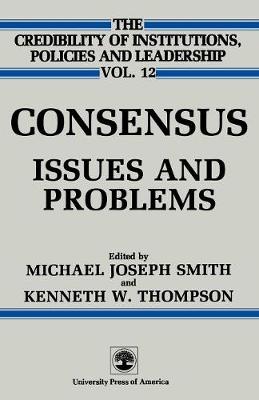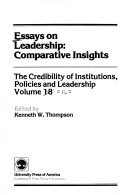The Credibility of Institutions, Policies and Leadership
3 primary works • 5 total works
Volume 11
Foreign Policy and Domestic Consensus
by Richard A. Melanson and Kenneth W. Thompson
Published 12 August 1985
^R This volume deals chronologically with the issue of domestic consensus since the Cold War consensus initially crystallized in the late 1940s. Contents: The Cold War Consensus: From Fearful Hostility to Wary Contempt, John Mueller; ^IThe Marshall Plan: A "Non-Presidential" Consensus? David Clinton; Eisenhower, Congress and the Cold War Consensus, Norman A. Graebner; Vietnam and the Breakdown of Consensus, William C. Gibbons; Para-Institutional Elites and Foreign Policy Consensus, Jerry W. Sanders; The Grenada Intervention: Prelude to a New Consensus? Richard A. Melanson.
Volume 12
^R This volume examines certain recurrent issues in the fashioning and maintenance of consensus. Contents: Introduction, Kenneth W. Thompson, Preface, Kenneth W. Thompson; Simplification vs. Explanation Michael Joseph Smith; Two Crises, Not One, Major S. Nelson Drew; Nuclear Compliance and Consensus, Lynda M. Rozell; New Law on Old Foundations: Newly Independent States and the Established International Legal System, Betty A. Hempfling; Leadership and Consensus, Nicolai Petro; Concluding Observations, Kenneth W. Thompson; Appendix A: Vietnam Involvement Was a Failure, Not a Folly, John Mueller; Appendix B: United States Foreign Policy: A Theory-Practice-Support Connection, Phillip W. Buchen.
Volume 16
This volume provides comparative insights into the life and work of five postwar leaders whose actions and thought shaped the world.; Contents: Preface Introduction The Dilemmas and Antimonies of Leadership,^R Kenneth W. Thompson Churchill as Philosopher and Statesman, Michael Fowler Jean Monnet and the Cold War, John B. Bellinger III Konrad Adenauer, Michael Baun Eisenhower and Suez, Todd A. Kushner Adlai E. Stevenson, Don Mitchell Kim Il Sung, Captain Jim Marks, USN Adenauer and his Successors, K. Michael Prince
This discussion of world leadership is approached from two broad perspectives. The first looks at leadership from a functional standpoint. The second examines U.S. leadership in two crucial regions of the world) Asia and the Middle East.
This volume concludes the Hewlett Foundation Series on the credibility of American leadership and institutions. The 13 essays are divided into four parts: 'The President, Politics and Foreign Policy,' 'Vietnam and the Future,' 'The Nuclear Crisis,' and 'The Credibility of Leadership in the Future.'


